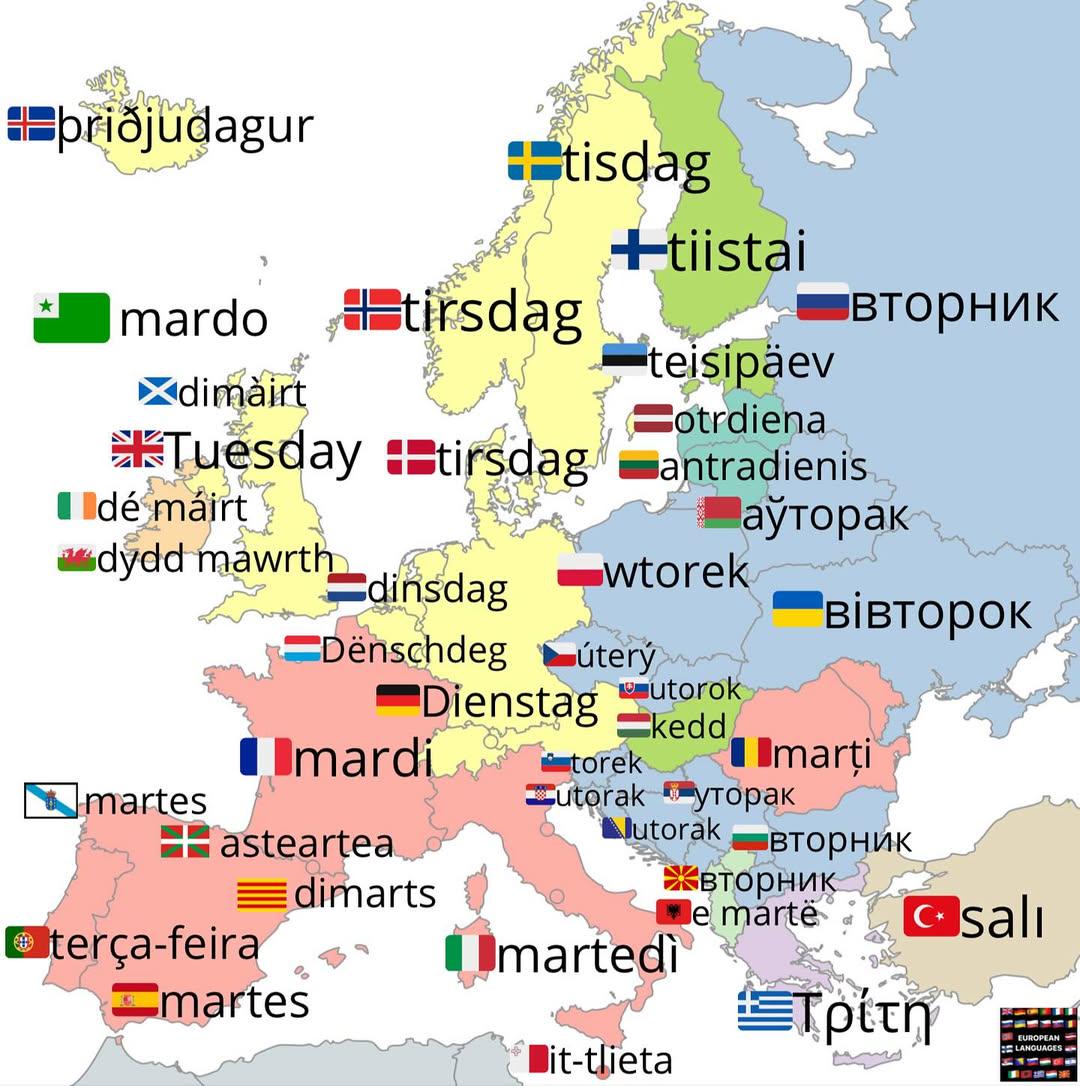How to Say Tuesday in Various Languages Map


Marcus Rodriguez
Historical Geography Expert
Marcus Rodriguez specializes in historical cartography and geographic data analysis. With a background in both history and geography, he brings unique...
Geographic Analysis
What This Map Shows
This visualization presents how the word "Tuesday" is expressed across different languages around the world. Through this map, we can see the linguistic diversity and the cultural significance attached to the days of the week in various regions. Language is a fundamental aspect of culture, and the way we name days often reflects historical, religious, and social influences.
Deep Dive into Days of the Week
The naming of days in many languages is deeply rooted in history and mythology. For example, in English, "Tuesday" is derived from Old English "Tiwesdæg," which translates to "Tiw's day." Tiw (or Tyr) is a god of war in Germanic mythology, paralleling the Latin name for Tuesday, "dies Martis," named after Mars, the Roman god of war. This connection between language and mythology illustrates how ancient beliefs continue to influence modern vernacular.
Interestingly, many languages have a common structure for naming the days of the week, often based on celestial bodies and mythological figures. In Romance languages, for instance, the connection to planetary bodies is clear. In Spanish, "martes" directly relates to Mars, just like in Italian, where it's "martedì." This consistency highlights the shared cultural heritage among these languages, stemming from Latin origins.
Moreover, in cultures that have a seven-day week, such as those influenced by Abrahamic religions, the names for days often carry a significant spiritual connotation. For example, in Arabic, Tuesday is "يوم الثلاثاء" (Yawm ath-Thulāthā'), which translates to "the third day," indicating its position in the week rather than being named after a deity.
The variety in naming also reflects regional linguistic characteristics. In some languages, like Turkish, Tuesday is called "Salı," which has no direct connection to a deity but is instead derived from a Proto-Turkic word meaning “second.” This showcases how different cultures develop their own systems of naming based on local customs, traditions, and historical context.
Additionally, many indigenous languages have their unique terms for days, often influenced by the natural world or agricultural cycles. For instance, some Native American languages may not have a concept of a seven-day week at all, instead organizing time around seasonal changes or lunar cycles. This divergence from the standard calendar reflects a deep connection to nature and a different understanding of time.
Regional Analysis
When we examine the map, we can identify several linguistic patterns by region. In Europe, the influence of Latin is prevalent, leading to similar roots in many Romance languages. Conversely, in Asia, languages like Mandarin and Hindi exhibit entirely different structures and etymologies for the word Tuesday. For example, in Mandarin, Tuesday is "星期二" (Xīngqī'èr), meaning "the second day of the week.” This systematic naming demonstrates how different cultures conceptualize and structure their calendars.
In Africa, the diversity of languages presents a rich tapestry of terms for Tuesday. In Swahili, it's referred to as "Jumanne," a term that has Arabic influences, showcasing the historical trade and cultural exchanges that have occurred across the continent. In contrast, languages such as Zulu or Xhosa use entirely different naming conventions, often more closely related to their local traditions.
What's fascinating is that even within the same country, various dialects can yield different names for Tuesday. In India, for instance, languages like Tamil, Bengali, and Hindi all have distinct words for Tuesday that reflect their unique linguistic heritages.
Significance and Impact
Understanding how different cultures name the days of the week, particularly Tuesday, offers insight into the values and historical connections that shape our societies. Language is not just a communication tool; it is a carrier of culture and tradition. The way we refer to time can indicate our priorities, beliefs, and historical influences.
Moreover, as globalization continues to blend cultures, the preservation of these linguistic differences becomes increasingly vital. Learning about how others express something as simple as a day of the week can foster greater appreciation for cultural diversity. It also raises questions about how language evolves and adapts over time in response to social changes.
As we move forward, we must consider the implications of language on our understanding of cultural identity. With the rise of digital communication, many indigenous languages are at risk of disappearing. Efforts to document and celebrate these unique linguistic expressions are crucial in maintaining the world's cultural heritage.
In conclusion, the way we say "Tuesday" is a small yet significant reflection of the vast tapestry of human culture and history. By exploring these linguistic variations, we gain not only knowledge of language but also a deeper understanding of the myriad ways in which societies express their experiences and values.
Visualization Details
- Published
- August 19, 2025
- Views
- 92
Comments
Loading comments...